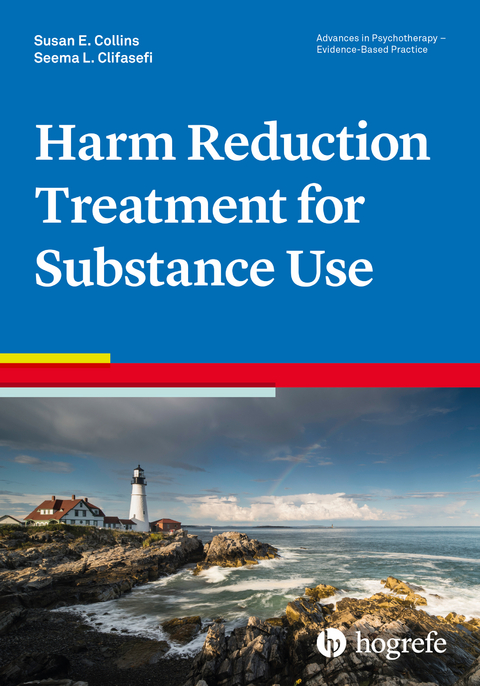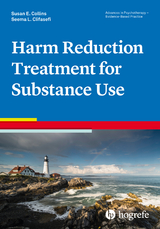Harm Reduction Treatment for Substance Use
Hogrefe Publishing (Verlag)
978-0-88937-507-9 (ISBN)
Concrete guidance on harm reduction treatment (HaRT) with substance-using patients:
* Written by experts from the field
* Details a unique evidence-based approach
* Includes example scripts
* Provides case studies
* Includes downloadable handouts
Harm reduction approaches are effective, patient-driven alternatives to abstinence-based treatment for people who are not ready, willing, or able to stop using substances. This volume outlines the scientific basis and historical development of these approaches, and reviews why abstinence-based approaches often do not work. The authors then share their expertise about harm reduction treatment (HaRT), an empirically based approach co-developed with community members impacted by substance-related harm - a first of its kind. The reader learns in detail about the pragmatic mindset and compassionate heartset of HaRT and the three treatment components: measurement and tracking of patient-preferred substance-related metrics, harm-reduction goal setting and achievement, and discussion of safer-use strategies. This volume walks practitioners through all components, provides example scripts for use in daily practice, and illustrates the work through case studies and input from community members. Handouts are available for use in daily practice. This is essential reading for clinical psychologists, psychotherapists, and researchers who encounter people who have substance-use problems.
Susan E. Collins, PhD, is a licensed clinical psychologist, faculty at the University of Washington School of Medicine and Washington State University, and co-director of the Harm Reduction Research and Treatment (HaRRT) Center. Dr. Collins has been involved in substance use research, assessment, and treatment for over 25 years and has disseminated this work in more than 80 book chapters, abstracts, and peer-reviewed articles. Dr. Collins also brings her own lived experience as a person in recovery from addictive behaviors and as a woman embedded in families with the intergenerational experience of substance use disorder and harm. Seema L. Clifasefi, PhD, MSW, is an associate professor and co-director of the Harm Reduction Research and Treatment (HaRRT) Center at the University of Washington-Harborview Medical Center. Her research lies at the intersection of substance use, mental health, criminal justice, and housing policy. For the past nearly two decades she has been part of several collaborative academic/community-based research partnerships focused on the development and evaluation of individual and community-level harm reduction programs and interventions designed for and with people who have lived experience of homelessness and substance use problems.
Acknowledgments
Preface
1 Description
1.1 Terminology and Definitions
1.1.1 Harm Reduction Heartset as Foundation
1.1.2 Harm Reduction Mindset as Pragmatic
1.1.3 Harm Reduction Applied at Various
Systems Levels
1.2 Applying Harm Reduction in Clinical Work
1.2.1 Accepting Substance Use Is Here to
Stay
1.2.2 Important Reasons for Acknowledging
Clients Use
1.2.3 Recognizing Substance-Related
Harm Is Shaped by Systems
1.2.4 Supporting Clients' Own Steps Toward
Harm Reduction
1.2.5 Working Toward Social Justice and
Racial Equity
1.3 Clinicians' Rationale for Harm Reduction .
1.3.1 Abstinence-Only Approaches Are
Disempowering
1.3.2 Abstinence-Based Approaches Do
Not Optimize Engagement
1.3.3 Harm Reduction Approaches Are
Effective
1.4 The Harm Reduction Treatment Model
1.5 Related and Foundational Treatment
Models
1.5.1 "Controlled Drinking"
1.5.2 Brief Interventions in Health Care
Settings
1.5.3 Personalized Normative Feedback
Interventions
1.5.4 Motivational Interviewing
1.5.5 Guided Self-Change
1.5.6 Harm Reduction Psychotherapy
1.6 Conclusions
2 Theories and Models Informing HaRT
2.1 Pharmacological Treatment for HaRT
2.2 Behavioral Harm Reduction Treatment
Theory
2.2.1 HaRT Mindset
2.2.2 HaRT Heartset
2.2.3 HaRT Components
2.3 What HaRT Is Not
3 Assessment and Treatment Indications
3.1 Treatment Indication
3.2 Indication and Preparation for HaRT
3.2.1 Reflecting On and Preparing Your
Practice Setting
3.2.2 Preparing to Navigate Systems For
and With Clients
3.3 Assessment of HaRT Efficacy on Key
Outcomes
3.3.1 Assessment of Safer-Use Strategies
and Harm Reduction Goal Setting
3.3.2 Assessment of Substance Use Outcomes
3.3.3 Lab Testing and Biomarkers
3.3.4 Measures of QoL Outcomes
3.3.5 Measures for Utilization and Cost
Analysis
3.3.6 Treatment Integrity Materials and
Measures
4 HaRT Implementation
4.1 Method of Approach
4.1.1 HaRT Mindset
4.1.2 HaRT Heartset
4.1.3 HaRT Components and Their Integration
in Initial and Follow-Up Sessions
4.2 HaRT Efficacy and Prognosis
4.2.1 Behavioral Harm Reduction Treatment
for AUD
4.2.2 Combined Pharmacotherapy and
Behavioral Treatment
4.3 Variations and Combined Treatments
4.3.1 Auxiliary HaRT Components
4.4 Problems in Carrying Out the Approaches
4.5 Diversity Issues
5 Case Vignettes
6 Further Reading
7 References
8 Appendix: Tools and Resources
| Erscheinungsdatum | 02.08.2023 |
|---|---|
| Reihe/Serie | Advances in Psychotherapy - Evidence-Based Practice ; Vol. 49 |
| Verlagsort | Toronto |
| Sprache | englisch |
| Maße | 177 x 254 mm |
| Themenwelt | Geisteswissenschaften ► Psychologie ► Klinische Psychologie |
| Geisteswissenschaften ► Psychologie ► Persönlichkeitsstörungen | |
| Medizin / Pharmazie ► Medizinische Fachgebiete ► Suchtkrankheiten | |
| ISBN-10 | 0-88937-507-0 / 0889375070 |
| ISBN-13 | 978-0-88937-507-9 / 9780889375079 |
| Zustand | Neuware |
| Informationen gemäß Produktsicherheitsverordnung (GPSR) | |
| Haben Sie eine Frage zum Produkt? |
aus dem Bereich




